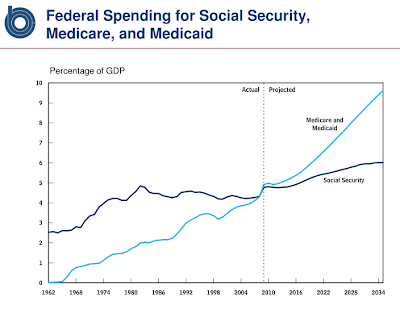 We have to balance environmentalism with income inequality.
We have to balance environmentalism with income inequality.The USA is a very unequal society. Median household income is about where it was was 1973. Yet GDP per capita is up by 86%. A family of 4 living on $32,500 (at the 34th percentile) or one living on $55,000 (at the 58th percentile) cannot afford higher energy costs. They can barely make ends meet as it is. They have bigger fish to fry.
That doesn't mean that I don't think we should address global warming. I just don't want to do it on the back of the poor. We live in a very unequal society that has become increasingly so since 1973. So here are some ideas:
1. Sources of Revenue
i. A federal tax on second homes - 2.5% of the market value.
ii. An escalating tax (the tax rate goes up every year by 5%) on new cars that get less than 30 mpg. Then raise the minimum mpg every year by 5%.
Year 1 - less than 30 mpg - 5% federal sales tax.
Year 2 - less than 31.5 mpg - 10% tax.
Year 3 - less than 33 mpg - 15% tax.
Year 10 - less than 48.9 mpg - 50% tax.
The tax would only charged on new autos when first purchased. This very quickly raises fuel efficiency and lower carbon emissions without penalizing the bottom 50%. The same concept for SUVs, vans and trucks just starting from a lower threshold and with the mpg rising more slowly.
iii. A 10% federal tax on private and corporate jets and a 10% sales tax on aviation fuel for them.
2. Sources of spending cuts
i. Cut defense spending from 5% to 4% of GDP
3. Sources of spending
i. Direct electrical power substitution. Starting with coal which is by far the worst polluter. Close down coal power plants replacing them with subsidized nuclear, solar, hydro electric and wind power stations. The subsidy need to be large enough such that he cost of power to the consumer is no higher than it currently is. Then move to oil and then gas. It will take 30 - 45 years to complete this process.
ii. We need a modern version of the Manhattan project - 1% of GDP spent on r&d on clean energy every year. We spend pitiful amounts right now on clean energy. This should include mechanisms of generating energy (solar, wind and hydro), mechanisms of storing energy (batteries and hydrogen fuel cells), methods of manufacturing that are environmentally sustainable while concurrently studying the economic, social, environmental, health and national security implications of the new technology. This would involve looking at the trade offs between these competing interests.
iii. Subsidize 'clean concrete' and use zero emissions electricity to make it. (There actually is research going on in this field right now.) Same concept for paper and aluminum manufacturing.
iv. Heavily subsidize home insulation upgrades - they currently do this in parts of the EU.
v. Aggressive energy saving standards on appliances. But it has to be subsidized! I know all about this personally because 2 years ago when I bought a washing machine, the price of a basic but reliable one doubled overnight because of fuel efficiency standards. If you are poor it's a big deal spending $350 vs $175 on a washing machine.
4.General policy
i. Abandon carbon sequestration - from an engineering point of view it's just not practical.
ii. Right now building solar and wind farms gets tied up in litigation. We need a federal 'fast track' approval process that is quick and environmentally responsible while realizing that there will always be NIMBYs. (e.g. The Cape Wind Project which is 5 miles out to sea. Cape Wind originally applied for a permit in 2001. It's 2010 and they only just got permission. And yet it was vigorously fought. The same thing happens with solar panels in the desert. Without a fast track approval process clean energy progress will be glacial.)
iii. We have to balance what we do with respect to further restrictions on industry with the effect on unemployment and wages. Manufacturing is one of the last places where people can earn living wages without being highly academically qualified. So I would be very opposed to forcing a facility to shut down (e.g. an auto plant) because of new environmental regulations where workers make $30 - $50 an hour. Once it's shut down it's very likely that the newly laid off workers would only make $10 - $20 an hour if they find any job. This economic reality has occurred a lot in the mid west - especially in Flint MI.

